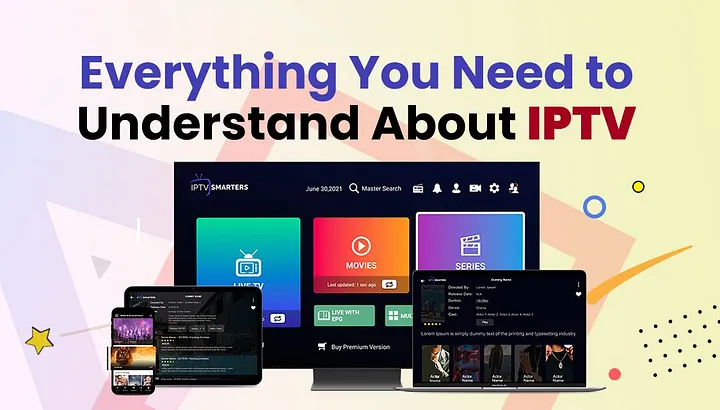
The world of television has evolved significantly, with IPTV (Internet Protocol Television) emerging as a popular and efficient way to consume TV content. Whether you are a tech enthusiast or someone simply looking to upgrade their TV experience, understanding IPTV is essential. This ultimate guide will cover everything you need to know about IPTV in 2024, from its basics to advanced features and benefits.
Table of Contents:
- What is IPTV?
- How Does IPTV Work?
- Types of IPTV Services
- Live IPTV
- Video on Demand (VOD)
- Time-Shifted IPTV
4. Benefits of IPTV
5. How to Choose the Right IPTV Service
6. IPTV vs. Traditional TV: A Comparison
7. Required Equipment for IPTV
8. Common IPTV Features
9. Legal Aspects of IPTV
10. The Future of IPTV

1. What is IPTV?
IPTV stands for Internet Protocol Television, a system where television services are delivered using the Internet protocol suite over a packet-switched network like the Internet, instead of being delivered through traditional terrestrial, satellite signal, and cable television formats.
2. How Does IPTV Work?
IPTV works by transmitting video content through internet protocols, allowing users to stream content in real-time. Instead of broadcasting a range of shows on a set schedule, most IPTV uses video on demand (VOD) or time-shifted media (catch-up TV) to allow users to select and watch content whenever they choose.
3. Types of IPTV Services
IPTV services are generally categorized into three main types:
Live IPTV
Live IPTV is similar to broadcast TV where you can watch shows and events live as they are broadcasted. It streams live TV channels via the internet.
Video on Demand (VOD)
VOD services allow users to select and watch video content whenever they want, rather than at a scheduled broadcast time. This includes movies, TV shows, and other video content.
Time-Shifted IPTV
Time-shifted IPTV allows users to watch previously broadcasted television content at a later time. This includes catch-up TV services and allows for pausing, rewinding, or fast-forwarding content.
4. Benefits of IPTV
IPTV offers several advantages over traditional TV formats, including:
- Flexibility: Watch your favorite shows and movies anytime and anywhere.
- High-Quality Streaming: Enjoy content in HD and 4K quality without signal interference.
- Interactive Features: Pause, rewind, and fast-forward live TV.
- Cost-Effective: IPTV services are often cheaper than traditional cable or satellite TV.
- Global Access: Access to international channels and content.
5. How to Choose the Right IPTV Service
When choosing an IPTV service, consider the following factors:
- Content Library: Ensure the service offers a wide range of content that suits your interests.
- Compatibility: Check if the service is compatible with your devices (smart TV, smartphone, tablet, etc.).
- Quality: Look for services that offer high-definition and 4K streaming.
- Reliability: Choose a service with a good reputation for uptime and customer support.
- Cost: Compare the pricing of different services to find one that fits your budget.
6. IPTV vs. Traditional TV: A Comparison
- Broadcast Method: Traditional TV uses broadcast signals, while IPTV uses the internet.
- Flexibility: IPTV offers more flexibility with on-demand content and no fixed schedules.
- Quality: IPTV can provide higher quality streams without the interference that traditional signals can suffer from.
- Cost: IPTV is often more cost-effective with various subscription models and no hidden fees.
7. Required Equipment for IPTV
To use IPTV, you typically need:
- Internet Connection: A stable and high-speed internet connection.
- IPTV Receiver/Set-Top Box: Devices like Android TV boxes or smart TVs with IPTV apps installed.
- Subscription: A subscription to an IPTV service provider.
8. Common IPTV Features
IPTV services come with a range of features, including:
- Electronic Program Guide (EPG): A user-friendly interface to browse and select content.
- Personal Video Recorder (PVR): Allows recording of live TV to watch later.
- Multi-Screen Viewing: Watch different channels on multiple devices simultaneously.
- Catch-Up TV: Watch shows that were broadcast in the past few days.
9. Legal Aspects of IPTV
While IPTV technology itself is legal, the legality of IPTV services depends on the licensing of the content they provide. Make sure to use legitimate IPTV providers who have the rights to broadcast their content to avoid legal issues.
10. The Future of IPTV
The future of IPTV looks promising with continuous technological advancements. Emerging trends include:
- Integration with Smart Home Devices: IPTV services will become more integrated with smart home ecosystems.
- Enhanced Interactive Features: Expect more interactive and personalized viewing experiences.
- 5G Technology: The rollout of 5G networks will improve streaming quality and reduce latency.
- Expansion of Content Libraries: IPTV providers will continue to expand their content offerings, including more exclusive and original programming.
Conclusion:
IPTV is transforming the way we consume television content by offering more flexibility, higher quality, and a range of interactive features. As we move further into the digital age, IPTV will likely become the standard for TV viewing, providing a superior alternative to traditional TV formats.
